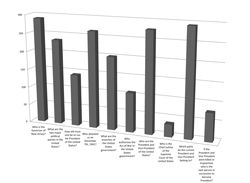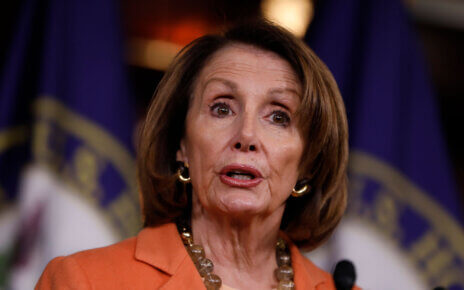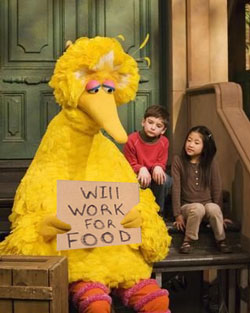Outlook Conducts First Political Knowledge Poll

The Outlook ran an informal political knowledge poll where University students scored an average of four to seven correct answers. It contained questions regarding the presidency, legislature, judiciary and United States history.
The question that students got incorrect the most was: “Who is the Chief Justice of the United States Supreme Court?”
Dr. Gregroy Bordelon, lecturer of law, said this falls in line with other facts. “It is in line with current research track I’m studying now. It’s not just Monmouth students, or even all college students for that matter, it’s the public in general. As the ‘Federalist Papers’ indicated, the judiciary is the ‘Weakest department’; others have called it, ‘The Least Dangerous Branch.’ I think Americans’ knowledge about the courts is situational, only when big events (spurned from the political branches) are being considered by the Supreme Court.
The questions about the presidency overwhelmingly had the most correct answers.
Kerry McCarthy, political science major, believes the timing of the poll may have had something to do with that. “You gave this questionaire around a busy time for the presidency because it is shown everywhere. Even if students don’t intend to watch or hear about what’s going on in the presidency they still get a taste of it. The presidency is everywhere,” McCarthy said.
Dr. Joseph Patten, Chair of political science and sociology Department, is teaching a class about the Presidency this fall. “I think the easiest question is about the American President because of the level of media attention assigned to the topic,” said Patten.
Another question that most students answered correctly was “Who is the Governor of New Jersey?” Governor Chris Christie has been a major figure head of the Republican Party and early supporter of GOP candidate, Mitt Romney. Christie also took center stage at the GOP National Convention. Christie is also known for his off the cuff remarks and always speaking his mind.
Two questions that were close in connection was, “Who attacked the United States on December 7th, 1941?” and “Who declares Act of War in the United States?” It is shown that the United States has not declared Act of War since World War II. However some students were under the impression that the president declares war. DeRosa will be teaching a class next year on World War II and recommends it to anyone who would like to learn more on this subject.
Dr. Christopher DeRosa, associate professor in history, believes the average scores could be for a multitude of reasons. “What answering four to seven questions correctly says about Monmouth students’ political knowledge might mean a variety of things, depending on whether you are comparing to the American population at large, students at other colleges, other Americans in the same age range, Monmouth students 24 years ago, or Monmouth students four years ago.”
“One might generalize, though, that many Americans, even those pursuing higher education, do not care to immerse themselves in the matters of the polity,” DeRosa said.
Bordelon said “I would say ‘ok’ but we can always shoot for better. It’s important for students to know these basic civic facts so as to better understand the political process in general and more important how it affects them directly.”
McCarthy said, “I believe it [the scores] says that students are not caring about what goes on in an important issue that really effect their lives or they feel that they have tried to vote and hope for change and nothing happens so they get discouraged and feel their opinions doesn’t matter.”
Both DeRosa and McCarthy agreed that the hardest question was “If the President and Vice President were killed or impeached, who is the next person in succession to become President?” DeRosa said, “I would imagine question 10, number three in the presidential succession line, would stump the most people because there is no historical example of it ever happening, and the line of succession has not always been the same.”
The scores were within the midway mark and are average but professors and students can do more. McCarthy suggests, “Professors could help educate them by throwing in their lessons a bit of politics that could relate to what they are learning. I know for my art class my professor incorporates politics in her lesson because there are some works of art that represent issues going on in the world.”
Dr. Nancy Meezy, associate professor of sociology, believes it’s on the students to research as well. “Certainly students should be encouraged to take courses in Political Science and related fields. But most professors across disciplines can include some political information in their courses. However, I think students need to take the initiative to consume political information that allows them to inform themselves. The questions you asked on the poll should be common knowledge, not something that needs to be taught in courses,” Meezy said.
DeRosa believes that teaching about politics is explaining why one should be interested in it. “Having waves and waves of teachers tell students ‘Names and dates’ are not important’ is probably not helping–learning about subjects requires some facility with such details. However, the main reason people learn the details of subjects are because they find those subjects interesting. Only when you are interested are you going to repeatedly expose yourself to details, and thereby internalize them. So I think if one is teaching about politics, one should try to demonstrate why one finds politics so interesting.”
Historical perspective is another good way to look at the poll and students general knowledge. “Historical context is crucial to seeing through the hysterical distortions in today’s political conversation. To give you just one example, if you have some clue what percentage of income was taxed in the top bracket across the U.S. prosperous 20th century, you could gauge whether a proposal to change the top bracket is returning to a norm or departing from a norm, a mild change or a dramatic change. If you don’t know, then you’re at the mercy of whatever propaganda is issued on the subject.”
The social impact of the knowledge or lack thereof may have lasting implications. Meezy said, “The political impact is that we live in a world in which our supposedly best educated citizens are not only uninformed about politics, but probably also misinformed. If students know so little about domestic politics, my guess is that they know even less about international politics. This to me is extremely scary as we cannot understand other people’s lives if we barely understand our own.”



